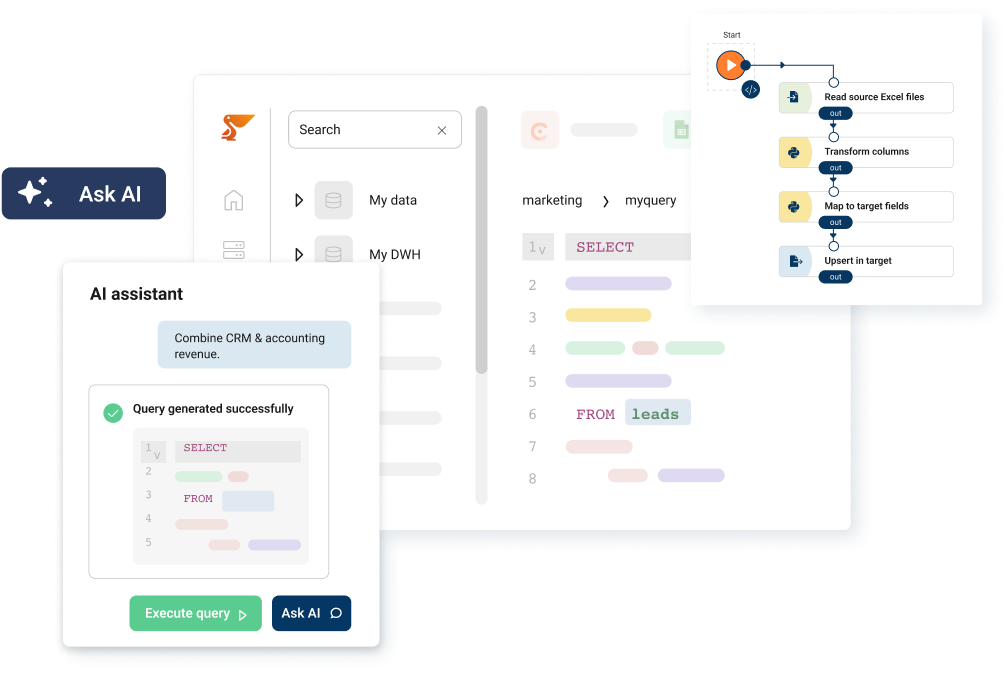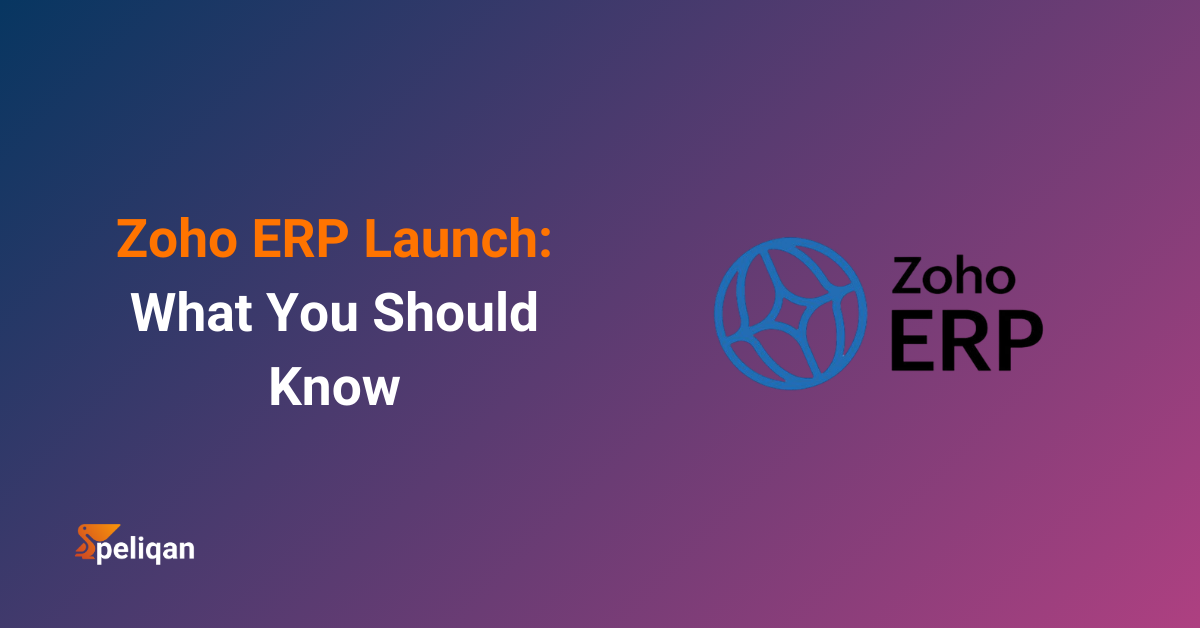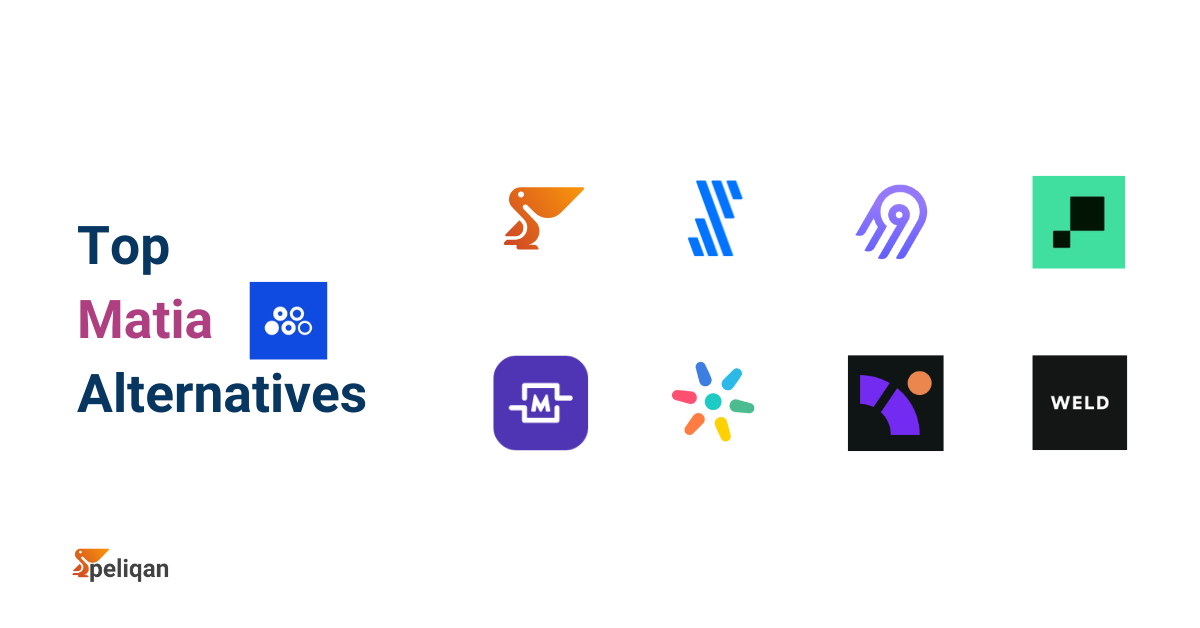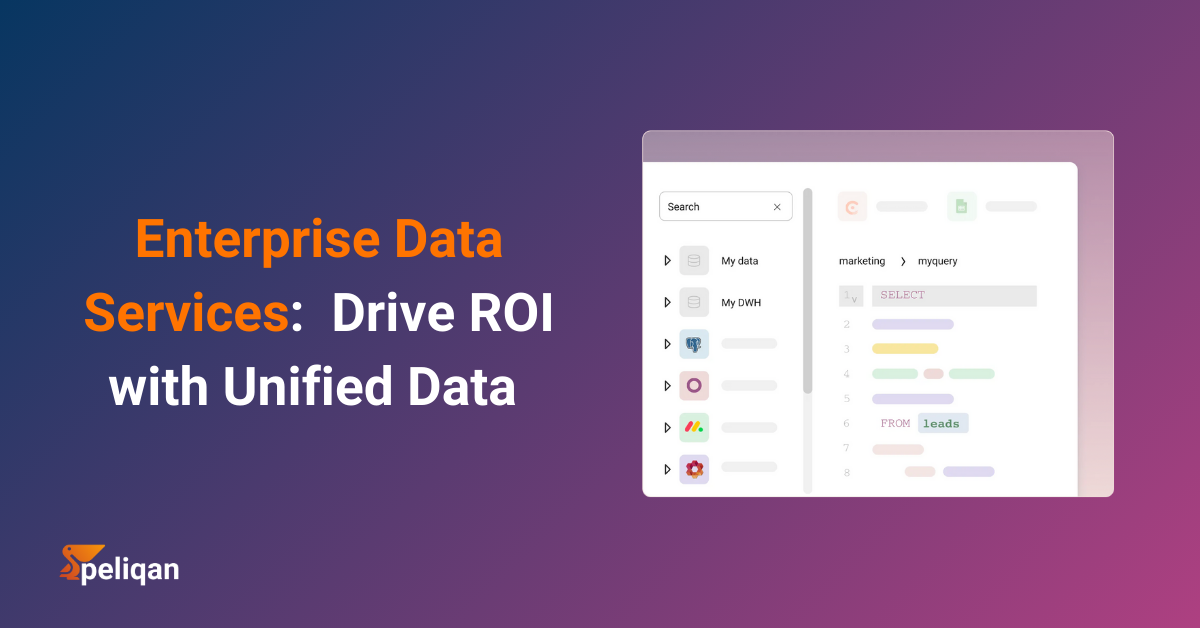CData has established itself as a leader in data connectivity with 300+ connectors and recognition in the 2024 Gartner Magic Quadrant. However, the rapidly evolving data integration landscape offers numerous alternatives that may better suit specific use cases, budgets, or technical requirements.
This comprehensive guide explores the top CData alternatives across enterprise ETL, cloud-native, and open-source categories.
Why consider alternatives to CData?
While CData has established itself with 300+ connectors and serves 7,000+ customers, many organizations are looking for alternatives. Many users also find CData difficult to learn and set up, with complex documentation that requires technical expertise. Performance can be slow when handling large datasets or real-time data processing.
Beyond these immediate issues, CData requires a lot of manual maintenance for things like error handling and schema changes. Modern alternatives offer automated solutions that handle these tasks automatically.
CData also lacks user-friendly features like visual pipeline builders and AI-powered tools that newer platforms provide. Many teams worry about being locked into CData’s system, making it hard to switch to other tools or integrate with modern data platforms they want to use.
CData competitors & alternatives in 2026
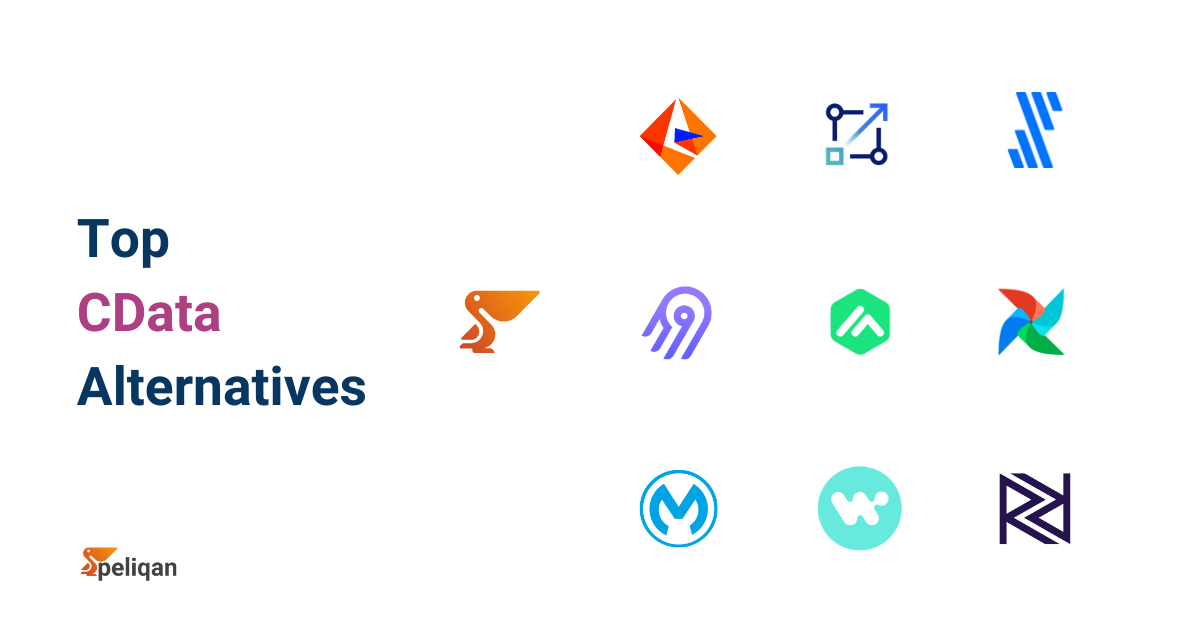
CData alternatives: Top 10
1. Peliqan – All-in-one data platform
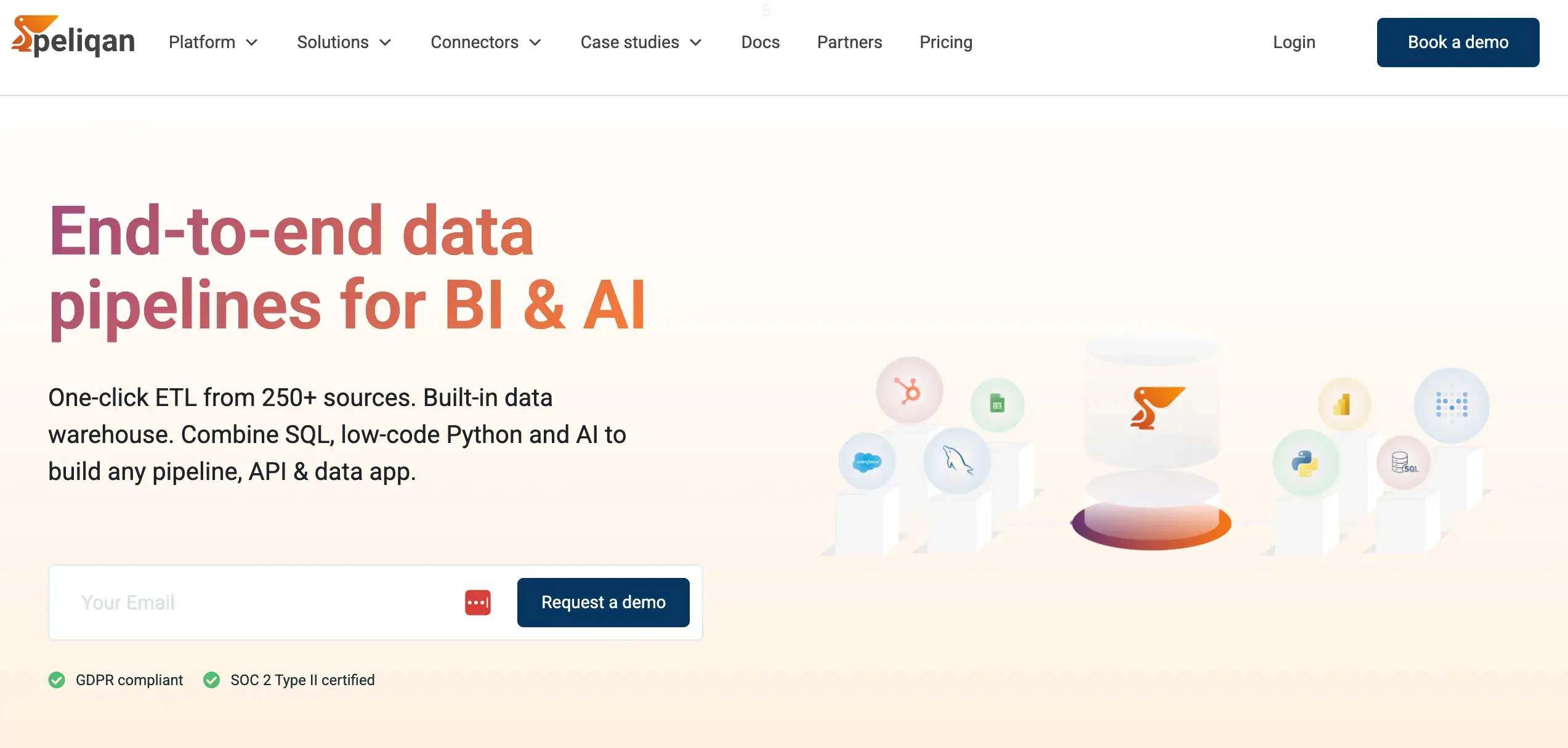
Peliqan is the best CData alternative that disrupts traditional data warehousing by consolidating the entire modern data stack into a single, user-friendly platform that enables data warehouse deployment in under 5 minutes. Founded in 2022 by industry veterans, Peliqan addresses the fundamental problem that solutions like hevodata are too complex, expensive, and fragmented for most organizations.
Core Capabilities and Differentiators
The platform combines comprehensive functionality in one solution:
- Built-in data warehousing with automatic optimization
- ETL/ELT pipelines with 250+ pre-built connectors
- AI-assisted data transformation and “Magical SQL” features
- Complete BI tools with visual analytics and dashboards
- Advanced data activation including reverse ETL and API publishing
Transparent, Predictable Pricing
Cost structure designed for budget predictability:
- Starter tier: $380/month
- Pro tier: $550/month
Technical Architecture
- Cloud-native SaaS foundation with SOC 2 Type II certification
- Trino-powered federated query engine for real-time cross-source queries
- Built-in PostgreSQL warehousing plus “Bring Your Own” integration
- Multi-cloud support including AWS, GCP, and Azure
- Enterprise security with role-based access and audit logging
Best for: Organizations seeking predictable costs, fast implementation, and reliable data integration without enterprise complexity.
2. Informatica IICS

Informatica IICS is the cloud-native arm of Informatica’s Intelligent Data Management Cloud (IDMC), known for its robust enterprise-grade capabilities and advanced AI-driven automation.
Ideal use cases
Large enterprises that need end-to-end data integration across cloud and on-premise with deep metadata and governance capabilities.
Key Features
- 600+ pre-built connectors across cloud and legacy systems
- CLAIRE AI engine for intelligent data management automation
- Integrated data governance and cataloging tools
- Flexible hybrid deployment (PowerCenter + Cloud)
Pros
- Enterprise-grade scalability and security
- Comprehensive platform supporting the full data lifecycle
- Strong metadata and lineage tracking
Cons
- High cost for entry-level use
- Complex implementation and setup
Pricing: PowerCenter starts ~$50,000/year; IICS: usage-based ~$1,000–$5,000/month
3. IBM DataStage
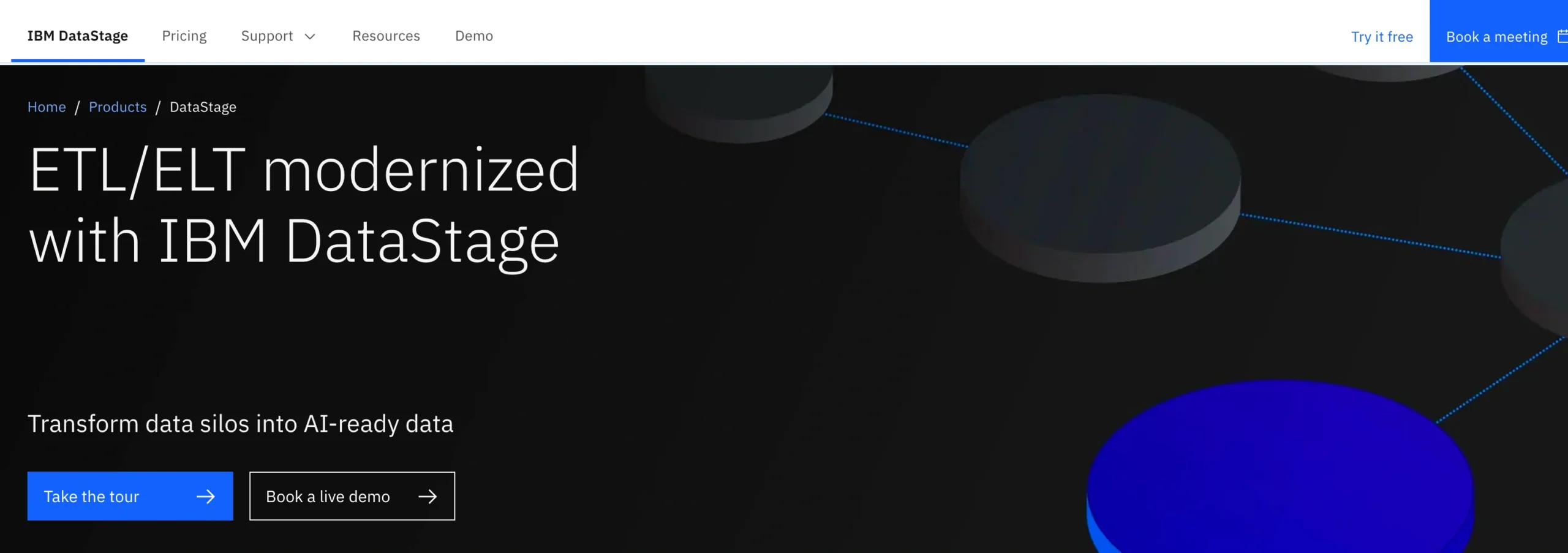
IBM DataStage is part of IBM Cloud Pak for Data, offering high-performance ETL with strong integration to IBM’s broader ecosystem and AI through Watson.
Ideal use cases
Companies with legacy systems, mainframes, or IBM-centric tech stacks requiring high-throughput and low-latency ETL.
Key Features
- Parallel processing engine for large-volume data
- Excellent support for mainframes and z/OS
- Integration with IBM Watson AI and Db2
- Governance-ready and secure
Pros
- Battle-tested platform for enterprise-grade ETL
- Excellent for regulated industries and legacy systems
Cons
- Steep learning curve
- Higher total cost of ownership
Pricing: From ~$35,000/year via IBM Cloud Pak + additional DataStage license
4. Fivetran

Fivetran is a fully managed ELT platform known for its automation-first approach and seamless data ingestion experience.
Ideal use cases
Cloud-native organizations looking for hands-free data ingestion and reverse ETL capabilities, especially using Snowflake, Redshift, or BigQuery.
Key Features
- 700+ managed connectors with guaranteed uptime
- Automatic schema evolution and maintenance
- Reverse ETL through Census integration
- Integrates with dbt, Snowflake, Redshift, and BigQuery
Pros
- Truly hands-off pipeline maintenance
- Strong uptime and reliability (99.9% SLA)
Cons
- Cost grows rapidly with data volume
- No advanced transformation engine
Pricing: Usage-based (Monthly Active Rows), ranges from ~$25,000–$200,000/year
5. Airbyte
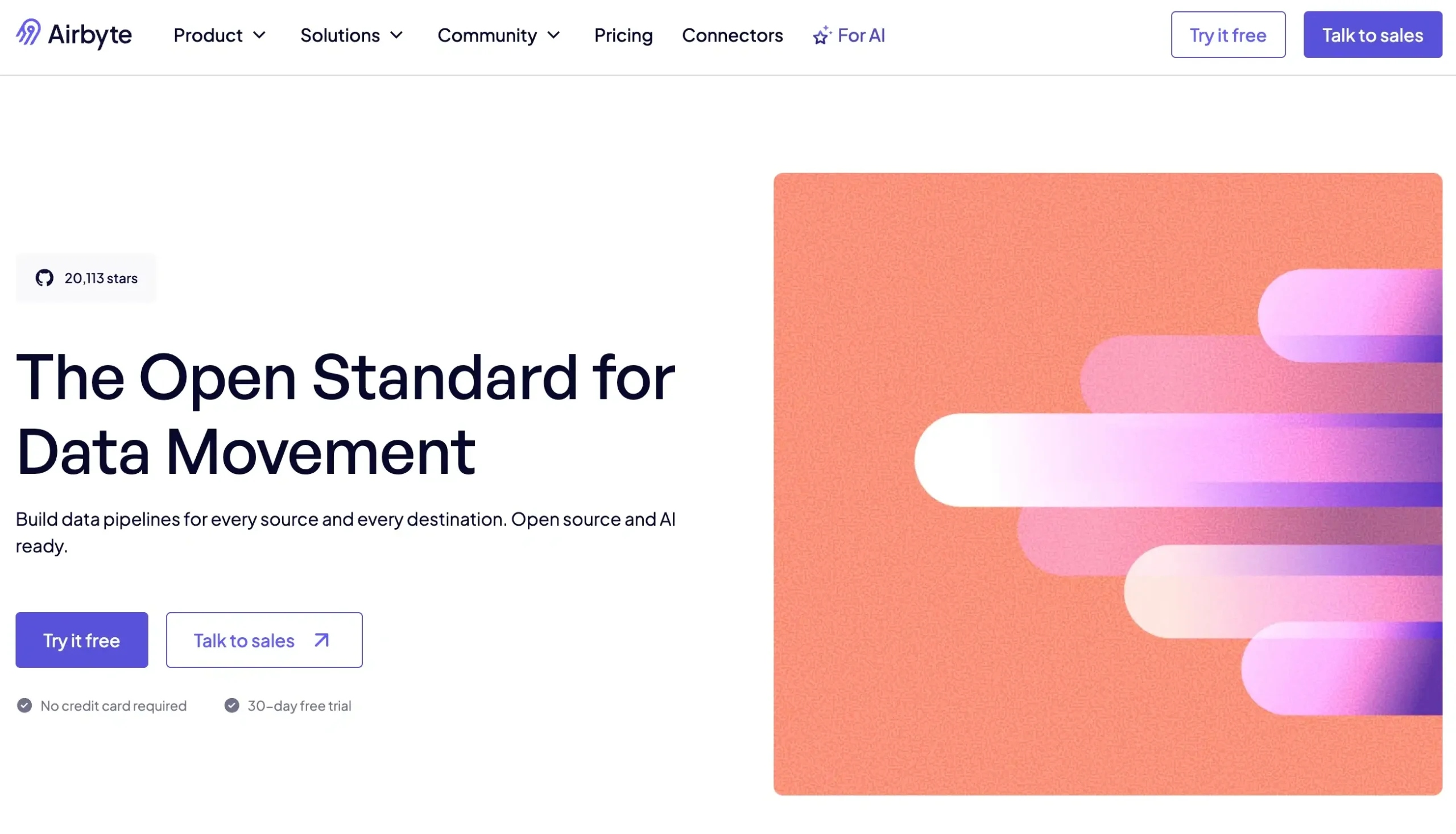
Airbyte is an open-source data integration platform that provides the largest connector catalog in the industry with self-hosted and cloud options.
Ideal use cases
Technical teams needing maximum customization and flexibility, especially with open-source preference and long-tail connectors.
Key Features
- 600+ connectors and growing via community contributions
- Connector builder for custom pipelines
- Modular deployment (self-hosted or cloud)
- Transparent and flexible pricing
Pros
- No vendor lock-in with open-source option
- Highly customizable and developer-friendly
Cons
- Requires technical expertise for setup
- UI and monitoring tools still evolving
Pricing: Open-source (free), Cloud: $0.50/credit, Enterprise: custom
6. Matillion

Matillion is a cloud-native ETL/ELT platform purpose-built for modern data warehouses like Snowflake, Redshift, and Databricks.
Ideal use cases
Cloud-first companies with large-scale transformations needing visual design and pushdown ELT into cloud DWHs.
Key Features
- Visual drag-and-drop ELT pipeline builder
- Supports SQL/Python transformations
- Pushdown architecture for performance
- Cloud platform integrations: Snowflake, Redshift, Databricks
Pros
- Optimized for cloud warehouse performance
- Easy for analysts and engineers alike
Cons
- Credit-based pricing can be complex
- Interface can feel heavy for simple use cases
Pricing: Credit-based model by vCore usage and plan (Developer to Enterprise)
7. Apache Airflow

Apache Airflow is the leading open-source orchestration tool, providing flexibility and full control over complex workflows.
Ideal use cases
Data engineering teams needing advanced orchestration logic, versioning, and workflow customization using Python.
Key Features
- Extensive operator library (350+)
- Declarative DAG-based orchestration
- Flexible integration with data tools and cloud platforms
- Massive open-source ecosystem
Pros
- No licensing costs
- Customizable and production-ready
Cons
- High setup and maintenance burden
- Requires Python and DevOps skillset
Pricing: Free (open-source), with managed options available via Astronomer, Google, AWS, etc.
8. MuleSoft Anypoint Platform
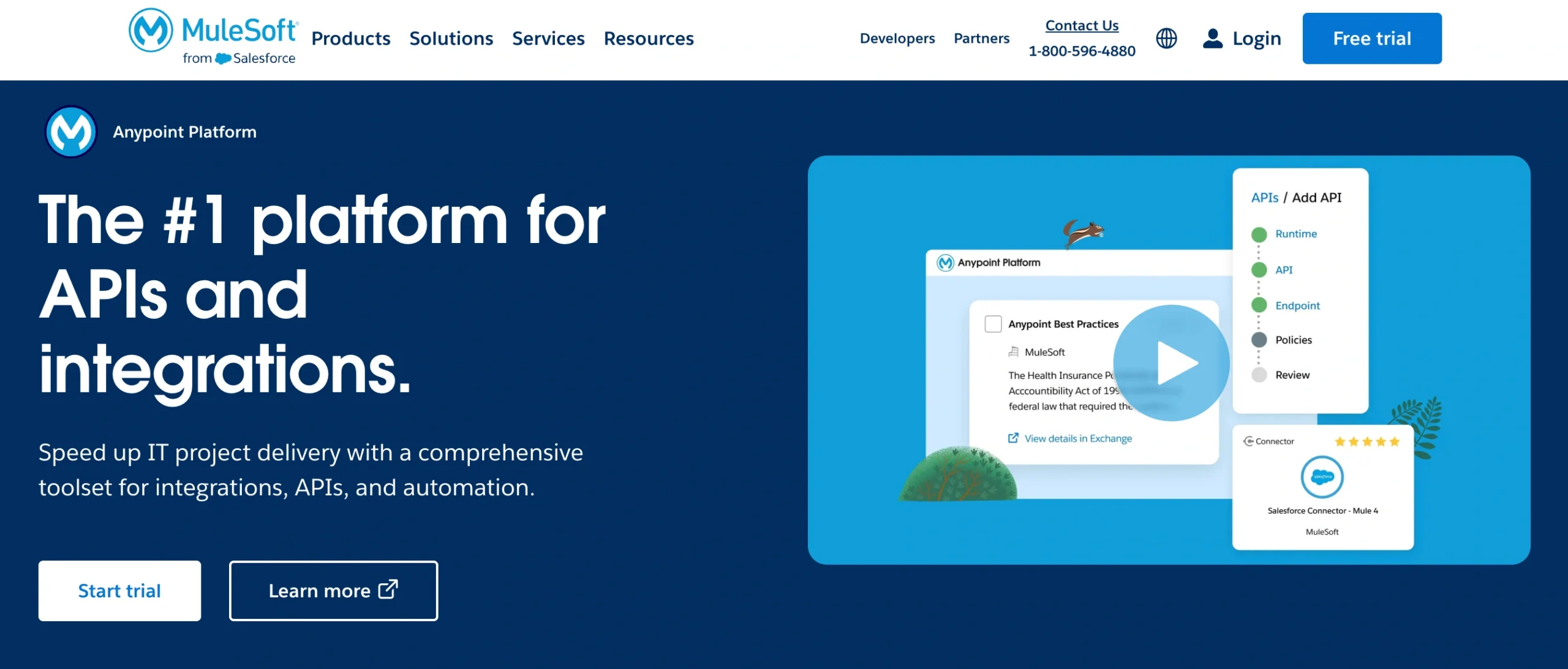
MuleSoft provides a complete API integration platform especially for Salesforce ecosystems, with enterprise-grade security and governance.
Ideal use cases
Large orgs needing robust API-led integration, especially Salesforce-native companies or regulated industries.
Key Features
- API lifecycle management (design, deploy, secure)
- High availability and global deployments
- Deep Salesforce integration
- Compliance and monitoring out of the box
Pros
- Best-in-class for API-led architecture
- Strong governance and enterprise features
Cons
- Expensive and complex pricing tiers
- May be overkill for simple ETL/ELT tasks
Pricing: Subscription model (Gold/Platinum/Titanium), custom enterprise quotes
9. Workato
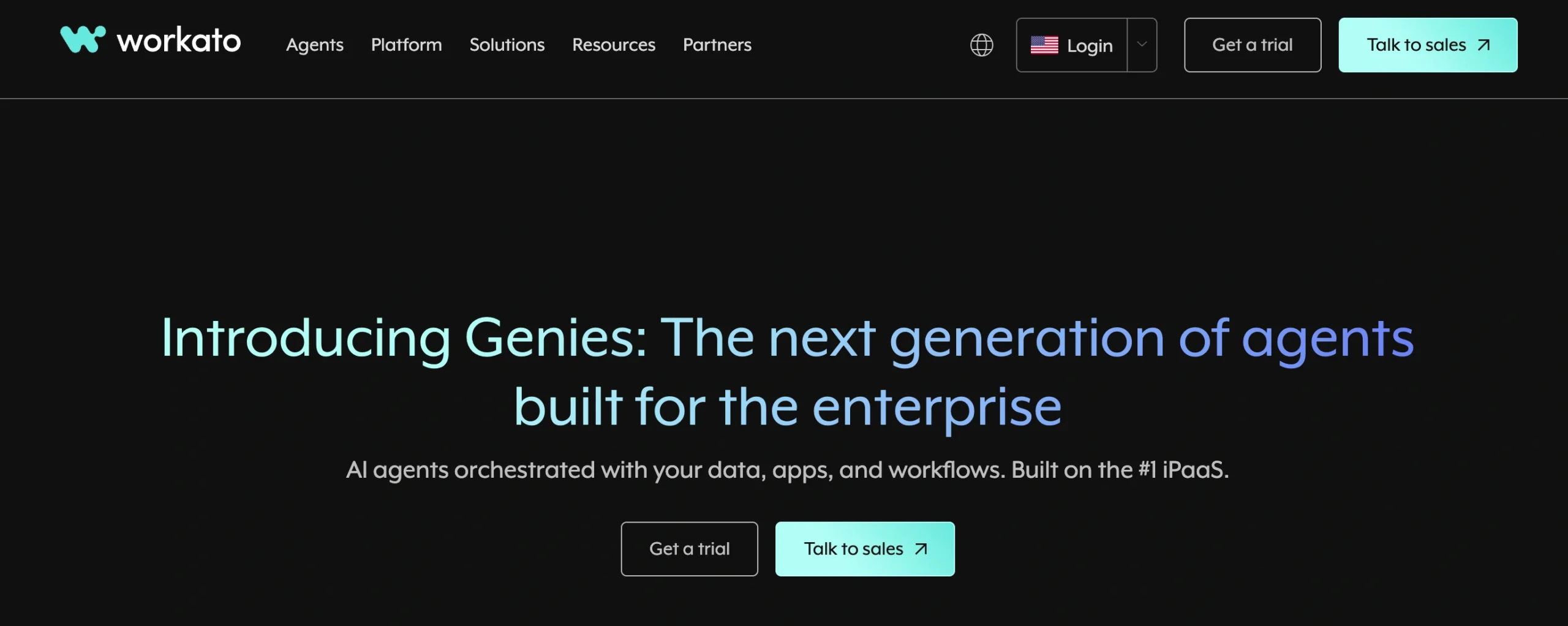
Workato is a leading iPaaS platform offering recipe-based automation accessible to both business users and IT teams.
Ideal use cases
Mid-market or enterprise teams automating cross-functional workflows without needing deep technical expertise.
Key Features
- Visual “recipe” builder for automation
- Real-time workflow automation with AI suggestions
- Secure integrations with governance and RBAC
- Supports 1000+ applications
Pros
- Business-user friendly UI
- Fast time-to-value
Cons
- Can become costly as workflows scale
- Limited control for deeply technical use cases
Pricing: Starts at ~$2,500/month, usage-based with recipe bundles
10. Rivery
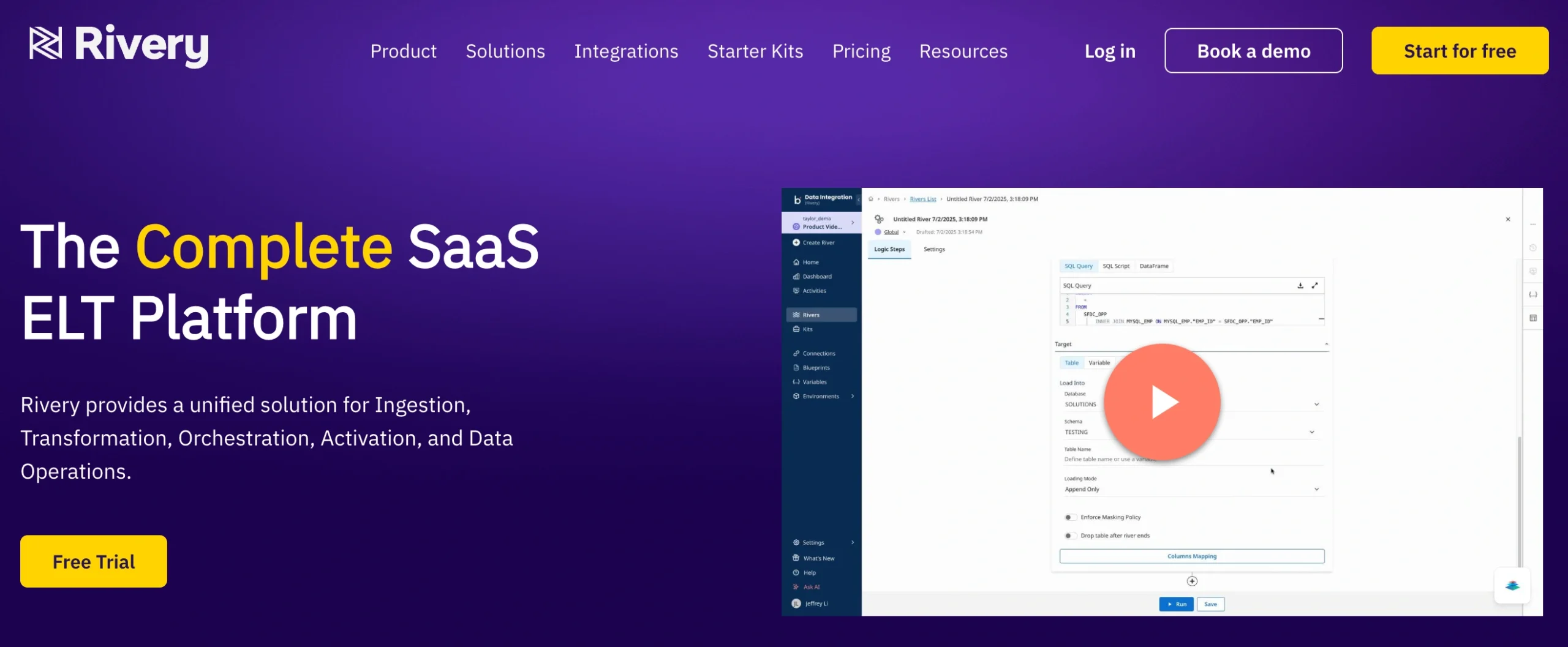
Rivery is a SaaS data platform combining ELT, orchestration, and reverse ETL with a credit-based pay-as-you-go pricing model.
Ideal use cases
API-heavy workflows and companies needing cost control across ingestion, transformation, and activation in one tool.
Key Features
- Unlimited connectors at no extra cost
- Change Data Capture (CDC) for real-time pipelines
- Custom API builder and Python script support
- Unified UI for ingestion, orchestration, and data ops
Pros
- Flexible credit pricing with no connector fees
- Strong CDC capabilities
Cons
- Interface may be overwhelming for simple use cases
- Limited community support
Pricing: Credit-based: Starter $0.75/credit, Pro $1.25/credit, Enterprise: custom
CData competitors comparison
Selecting the optimal CData alternative depends on your specific organizational needs, technical requirements, and strategic priorities. Here’s the quick comparison of top CData alternatives.
Conclusion
The data integration landscape offers numerous compelling alternatives to CData, each with distinct advantages for different use cases. Peliqan leads with transparent pricing and simplicity, making it ideal for organizations seeking predictable costs and fast implementation. Cloud-native solutions like Fivetran and Matillion excel in automation and modern data stack integration, while open-source platforms like Airbyte and Apache Airflow provide flexibility and cost-effectiveness for technical teams.
Enterprise organizations may benefit from comprehensive platforms like Informatica or IBM DataStage, while mid-market companies often find better value in specialized solutions like Peliqan, Workato, or Rivery. The key is aligning your choice with specific technical requirements, budget constraints, and long-term strategic goals.
As the market continues evolving toward AI-ready, real-time, and cloud-native architectures, organizations should prioritize platforms that support these modern requirements while providing the reliability and scalability needed for mission-critical data operations.

